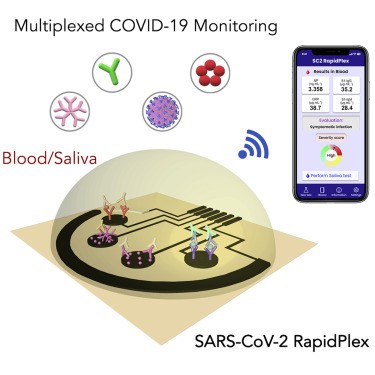Researchers from the California Institute of Technology have designed a new sensor that can enable at-home diagnosis of COVID-19 infection.
With the coronavirus disease observed as a highly contagious disease that can be transmitted even by people that does not display symptoms, containing the virus, and subsequently, the people infected with it is both challenging and time-critical. The development of rapid testing kits cut down on the time needed to assess whether some carries the coronavirus, with or without the symptoms.
The Caltech team designed a multiplex testing method - a test method that measures and combines multiple data - and incorporates a low-cost sensor that can diagnose COVID-19 in just 10 minutes or less. Details of their study are published in the journal Matter, Thursday, October 1.

Graphical representation for the SARS-CoV-2 RapidPlex - low-cost rapid testing developed by scientists from Caltech.
SARS-CoV-2 RapidPlex
Researchers called their proposed testing kit the SARS-CoV-2 RapidPlex, an ultrasensitive and cost-effective telemedicine platform based on target-specific assays that are created from laser-engraved graphene. This test kit conducts a multiplexed test by assessing a number of known COVID-19 biomarkers - nucleocapsid protein, the anti spike proteins IgG and IgM, and C-reactive proteins. It allows rapid assessment on what researchers called "three key aspects" of the novel coronavirus disease: viral infection, immune response, and disease severity.
RELATED: Philippines Studying Coconut Oil as Potential COVID-19 Treatment
The study on the novel testing kit was conducted in the lab of Caltech assistant professor Wei Gao, member of the Andrew and Peggy Cherng Department of Medical Engineering. Gao's team, according to a press release from the Institute, have previously worked on wireless sensors for monitoring a variety of health conditions including gout and stress via the concentration of certain proteins found in human fluids like saliva, sweat, or even blood.
The SARS-CoV-2 RapidPlex uses a sensor based on graphene, one of the possible arrangements of carbon atoms in a 2D honeycomb lattice, making it take a sheet-like form. They fabricated a porous 3D graphene structure, using a laser to etch these pores on a plastic sheet. The laser creates holes of precise measurements to detect compounds existing in only scarce amounts. This 3D graphene material is also embedded with specific antibodies that react to the COVID-19 biomarkers.
A Low-Cost, Rapid Response Testing Method
Earlier works from Gao's team included sensors that were doped with antibodies for the hormone cortisol, often associated with stress levels, and uric acid, which causes the disease gout at extremely high concentrations. With the SARS-CoV-2 RapidPlex sensors, the Caltech team used antibodies synthesized by the body against the virus, as well as chemical markers for inflammation, used to identify the severity of the infection.
"This is the only telemedicine platform I've seen that can give information about the infection in three types of data with a single sensor," Gao said. He further explained that with a few minutes, the different data can be assessed simultaneously, providing people with a "full picture of the infection," which includes infection, immunity, and severity.
RELATED: Researchers Demonstrate New Portable and Point-of-Care COVID-19 Test Kit
Should this be deployed, the RapidPlex can solve one of the persisting challenges of COVID-19 diagnosis, since existing technologies take hours to return results, also requiring expensive and specialized equipment to handle the processing.
The Caltech testing kit has only been tested under controlled conditions, using blood and saliva samples collected from previously diagnosed patients - both positive and negative for COVID-19. Gao noted that their sensor still requires additional testing to further determine its accuracy.
Check out more news and information on COVID-19 in Science Times.














